

Engagement: Just because they’re busy, doesn’t mean they’re learning anything. Does engagement actually matter? Suggesting that student engagement might actually be a bad thing tend to get certain people’s dander up.
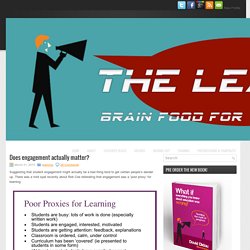
There was a mild spat recently about Rob Coe reiterating that engagement was a ‘poor proxy’ for learning. Carl Hendrick unpicked the problem further: This paradox is explored by Graham Nuthall in his book ‘The Hidden Lives of Learners,’ (2007) in which he writes:“Our research shows that students can be busiest and most involved with material they already know. In most of the classrooms we have studied, each student already knows about 40-50% of what the teacher is teaching.” p.24Nuthall’s work shows that students are far more likely to get stuck into tasks they’re comfortable with and already know how to do as opposed to the more uncomfortable enterprise of grappling with uncertainty and indeterminate tasks… The other difficulty is the now constant exhortation for students to be ‘motivated’ (often at the expense of subject knowledge and depth) but motivation in itself is not enough.
On Vocabulary: What is a 'Tier One' Word? - Teach Like a Champion. Bringing Words to Life is a landmark book for me and many other educators on the topic of vocabulary instruction.

It’s hard to say what the three most important ideas in it are because there are so many, but one of the most widely discussed in Beck, McKeown and Kucan’s discussion is how to choose which vocabulary words to teach. They divide words into three groups: Tier 1 words occur frequently in everyday life. Such words generally are not worth teaching explicitly, as they will be absorbed via continued natural exposure, Beck argues. Tier 3 words consist of technical vocabulary specific to a certain domain or discipline. The McNamara Fallacy and the Problem with Numbers in Education. Robert McNamara was by any standards, a wildly successful man.
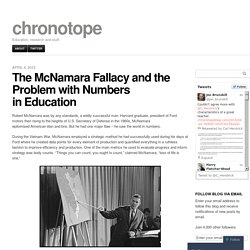
Harvard graduate, president of Ford motors then rising to the heights of U.S. Secretary of Defense in the 1960s, McNamara epitomised American élan and brio. But he had one major flaw – he saw the world in numbers. During the Vietnam War, McNamara employed a strategic method he had successfully used during his days at Ford where he created data points for every element of production and quantified everything in a ruthless fashion to improve efficiency and production. One of the main metrics he used to evaluate progress and inform strategy was body counts. The problem with this method was that the Vietnam war was characterised by the unmeasurable chaos of human conflict not the definable production of parts on a factory assembly line.
As the war became more and more untenable, McNamara had to increasingly justify his methods. GO_GuideCreatingMasteryOrientedClassrooms.pdf. How to Book Polish.docx. BERA-Paper-3-Philosophical-reflections.pdf. Over the Rainbow – Lisa Pettifer. 10 professional development strategies for one-to-one support Throughout the year, often as a result of a performance management observation, teachers are told that they are struggling, need to do things differently, need to improve.

When the observation statement, or judgement, has been delivered, the discussion has been had and the door is firmly closed, what is next for the teacher who is probably all-too-aware of the need to make changes, but not of the way to do this? If they had known HOW to do things differently, wouldn’t they be doing it? Less open or supportive institutions might take a cold and corporate approach here – “shape up or ship out”.
In my view, it is this approach that requires improvement. An experienced but non-threatening package of assistance is needed here. Love Learning Ideas. 10 strategies for ‘talk-better’ teaching. Image: @jasonramasami Teacher talk gets a bad press.
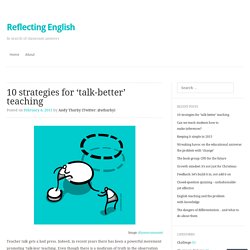
Indeed, in recent years there has been a powerful movement promoting ‘talk-less’ teaching. Even though there is a modicum of truth in the observation that some teacher talk is poorly planned and unfocused with a tendency to overrun, a carefully crafted explanation is simply the clearest and quickest way to convey new ideas. The Cult of Outstanding™: the problem with ‘outstanding’ lessons. First of all I need to come clean.
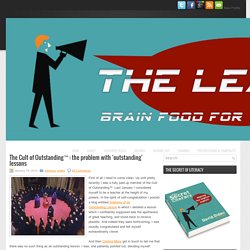
Up until pretty recently I was a fully paid up member of the Cult of Outstanding™. Last January I considered myself to be a teacher at the height of my powers. In the spirit of self-congratulation I posted a blog entitled Anatomy of an Outstanding Lesson in which I detailed a lesson which I confidently supposed was the apotheosis of great teaching, and stood back to receive plaudits. And indeed they were forthcoming. I was roundly congratulated and felt myself extraordinarily clever. A Review of the Sutton Trust Report – What Makes Great Teaching?
The 15 minute forum tonight was led by Andy Tharby.
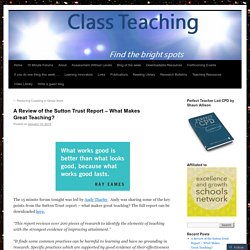
Andy was sharing some of the key points from the Sutton Trust report – what makes great teaching? The full report can be downloaded here. “This report reviews over 200 pieces of research to identify the elements of teaching with the strongest evidence of improving attainment.” “It finds some common practices can be harmful to learning and have no grounding in research. Specific practices which are supported by good evidence of their effectiveness are also examined and six key factors that contribute to great teaching are identified.”
Some Problems With “Action Research” I haven’t been as much on the twittersphere as of late, I find myself more of a lurker than a contributor.
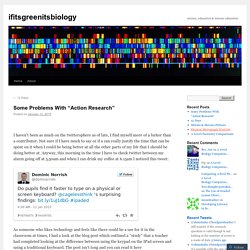
Not sure if I have much to say or if a can really justify the time that can be spent on it when I could be being better at all the other parts of my life that I should be doing better at. Anyway, this morning in the time I have to check twitter between my alarm going off at 5.50am and when I can drink my coffee at 6.15am I noticed this tweet: As someone who likes technology and feels like there could be a use for it in the classroom at times, I had a look at the blog post which outlined a “study” that a teacher had completed looking at the difference between using the keypad on the IPad screen and using a traditional keyboard.
The post isn’t long and you can read it here before continuing to read this if you want. I don’t know much about the research into the difference between typing speeds on tablets and keyboards. Why I Hate Highlighters! - HuntingEnglishHuntingEnglish. (Many thanks to the meme wizard, James Theobold, for this image) As an English teacher I am surely granted the eternal power of an exaggeration fueled headline every once in a while.

Ok – so perhaps highlighters aren’t the biggest problem in education, but if you know me well, you may have heard my complaint whereat these gaudy coloured pens symbolize some deep rooted issues with teaching and learning as I see it. For me, highlighters can represent how our habits of teaching and learning can go unexamined and how we can too easily waste time and money each year by not being truly critical about our practice in the classroom. Educational Leadership:Feedback for Learning:Seven Keys to Effective Feedback. The Year of #GreatTeaching. Whilst every year should be a year of great teaching it sometimes helps to focus if you name it.

So, 2015 is now the Year of Great Teaching. I’ve decided to challenge myself to produce the odd podcast as part of some posts. Here’s the first attempt: Over the past eighteen months I’ve gradually refined some ideas around what great teaching might look like and the steps towards it. The plan started at quite a simple level to explain differences in observed lessons and my subsequent conversations with teachers. Lesson Study. Anatomy of a Twitter Storm As you may be aware, I'm not a fan of Uncommon Schools, nor the famed Doug Lemov, whose book seems to be Uncommon Schools' handbook of teaching. If you don't know what they are, or who he is, I suggest you spend a while perusing their 205 videos on Vimeo, or looking up 'Teach Like a Champion'.
Contrary to accusations, I didn't have to hunt far, or scour the website to find the videos which caused the aforementioned storm on my timeline. Questioning and Feedback: Top Ten Strategies. As part of our whole staff training at Huntington School we have been sharing ideas and collating ‘Top Ten Strategies’. This list is the fruits of our labour: 1. Differentiated questioning. Questioning and Feedback: Top Ten Strategies. 12_TEAL_Deeper_Learning_Qs_complete_5_1_0. Is the Feedback You’re Giving Students Helping or Hindering?
In 38% of well-designed studies, feedback actually made performance worse—one of the most counterintuitive results in all of psychology. If there’s a single principle teachers need to digest about classroom feedback, it’s this: The only thing that matters is what students do with it. No matter how well the feedback is designed, if students do not use the feedback to move their own learning forward, it’s a waste of time.
We can debate about whether feedback should be descriptive or evaluative, but it is absolutely essential that feedback is productive. Add to that concept a second related principle: Feedback should be more work for the student than it is for the teacher. Teachers who internalize and practice feedback based on these precepts will be well on their way to teaching that improves learning. What the Studies Say Let’s examine what must be the oldest and most common forms of feedback in public education: grades, rankings, and written teacher comments on tests and papers.
Is the Feedback You’re Giving Students Helping or Hindering? Huntington School Teaching & Learning. It is a commonly used term, but do we actually really agree what DIFFERENTIATION mean? In the training session I described the following points: To continue to focus on planning lessons for the individual students you have in front of you; Differentiate FOR ability instead of BY ability; Trying to get the balance right – FLOW;
Sutton Trust Report 2014 coverage. Pedagogy Postcard #19: Pitching It Up. A series of short posts about specific elements of teaching practice that I think are effective and make life interesting. My problem with ability. I’ve always had a big problem with grouping students by ability. The Sutton Trust EEF Toolkit shows that ability grouping, setting or streaming has a negative impact on student attainment. Ability grouping slows progress down. What-Makes-Great-Teaching-REPORT.pdf. R-inspiring-teachers-summary-2014.pdf. This much I know about…improving both my teaching and my students’ learning. Outstanding - some indicators. Things I notice in schools. Teaching Standards 2012; aide memoire - Chris Chivers (Thinks)
Formative use of Summative Tests: Marking #Blogsync. A Science Test: Finding out what has been learned. Ever since the idea of formative assessment was expressed by Dylan Wiliam and Paul Black in ‘Inside the Black Box’, one of the practical strategies suggested has been the formative use of summative tests. ‘We must never forget that pupils are not data and teachers are not data managers’ Wednesday Period 4 – Data rich, information poor. Schools are data rich, but are we information poor? How do we balance the data, the numbers and dealing with real live children and helping them learn. Marking work every lesson – should we bother? Have We Got Feedback Backwards? The Goldilocks Bowl. The importance of hard work Man on the moon. The Pygmalion Effect. Dealing with Day-to-day Differentiation. DIY Teaching CPD: Introduction. What is good teaching? Following it up. A collection of posts for NQTs.
Dealing with Day-to-day Differentiation. The great grading debate. Work hard. Get smart. Be nice. Assembly ideas and materials. On observation rubrics. Can I be that little bit better at ......using methods to make feedbackstick? Towards ‘Impeccable Behaviour’. Together. The Pedagogy Postcard Series: All in one place. The Results Collection. The Behaviour Collection. Contemporary educational ideas all my staff should know about. Working with data – the narrative in the numbers. Assessment Without Levels – An Opportunity for Growth. How We Learn: The Science. The Level 4b myth. Lesson Study: 3 heads are better than 1. Education Week. Hattie's 8 Mindframes. Assessment Without Levels in PE. Twitter. 'I wanted pupils to know their exam results are just a small part of them' Lollipop Moments. Articles - Can observers spot good teaching? MET Project. Education Week. Straight Lines. The Myth of Progress Within Lessons. The Hegemony of the Lesson. InsideBlackBox. DIRTy Work.
Using DIRT as a Learning Journey. Make your 'Marking Policy' a 'Feedback Policy' Work scrutiny – What’s the point of marking books. Marking is an act of love. NAHT Assessment report summary. Hattie & Timperley, The Power of feedback. Hattie, Feedback in School. Q+A: Education expert Prof John Hattie - TV News Video.
Why are so many of our teachers and schools so successful? John Hattie at TEDxNorrkoping. Setting or streaming. 'I wanted pupils to know their exam results are just a small part of them'